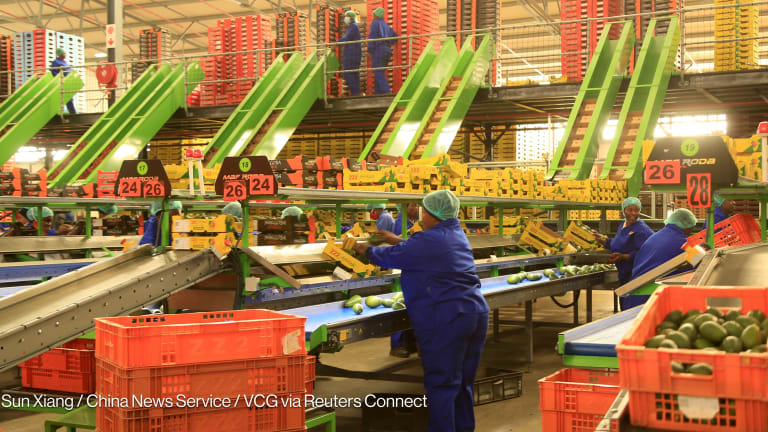
African and European leaders meet in Brussels later this week, for the sixth African Union-European Union summit. This is the first African and European leader summit since the outbreak of the COVID-19 pandemic and meeting following the 26th United Nations Climate Change Conference in Glasgow. The stakes are high and it is critical for the future of Africa that the entire world pay attention to what is said, or not said, in Brussels.
If adapting to climate change is the challenge facing our generation, then COVID-19 changed the playing field and made that job exponentially harder in Africa.
African governments were faced with extreme fiscal pressures before the pandemic. Then the combined effect of the pandemic and lockdowns pushed governments across the continent to choose between servicing their outstanding sovereign debt or providing desperately needed health and social services for their populations.
Whereas northern governments were able to pump trillions of dollars into their economies to weather the shocks, Africa did not have that option. Instead, African governments were forced to borrow even more to finance necessary emergency measures, exacerbating a sovereign debt crisis that was already at the tipping point at the start of 2020.
The Pro read:
Inside the latest Europe-Africa summit deliverables
A plan to rely more on the EU's own border agency in Africa is among those raising alarm.
Additionally, COVID-19 affects food security in Africa in a way that would be unimaginable today in Europe. The World Food Programme estimates that here in West Africa alone there are now more than 25 million people unable to meet their basic food needs, an increase of 34% compared to 2020.
Progress toward achieving the Sustainable Development Goals was largely reversed, and at least 40 million additional people in Africa were pushed into extreme poverty since the crisis began. Africa and Europe have two completely different sets of policy priorities as they contemplate the post-pandemic world. For Europe, it is “building back better,” while for Africa it is increasingly one of life-or-death to ensure that thousands more do not die.
One thing must be made crystal clear to the leaders of the European Union: Here, the pandemic is far from over. According to the World Health Organization, only 11% of the African population is fully vaccinated. While Europe is well on the path of offering multiple booster shots to their citizens, countries in the African continent are struggling to even get the first shot in everyone’s arm.
EU will be ‘loyal and dedicated partner’ to Sahel, official says
Emanuela Del Re, the EU’s special representative for the Sahel, tells Devex that the bloc sees opportunities for the African region despite challenges such as electoral uncertainty in Mali.
This AU-EU summit is a unique opportunity to recommit to the need for multilateral solutions to Africa’s problems. Africa cannot weather the brunt of this storm on its own. This is a point that Pope Francis consistently makes not only during the pandemic, but throughout his entire pontificate. In his 2015 encyclical, “Laudato Si,” he reminded us that “everything is closely interrelated” and that “today’s problems call for a vision capable of taking into account every aspect of the global crisis.”
In 2020, responding to the pandemic, he elaborated on these points in “Fratelli Tutti,” where he says that it is “an equally indispensable act of love to strive to organize and structure society so that one’s neighbour will not find himself in poverty,” and that one of the ways we do that is through multilateralism.
There are already several concrete ways in which reaffirmation of multilateral approaches to Africa’s recovery can take shape. One is for European countries to step up in their ambition to rechannel their Special Drawing Rights to African countries in order to address the immediate fiscal crisis.
In August 2021, the International Monetary Fund made a general allocation of SDRs to member states equivalent to $650 billion. However, the overwhelming majority of the allocation went into the coffers of the wealthiest developed countries that do not have the same need for them like Africa does. The G-20 called for $100 billion in SDRs to be rechanneled to low- and middle-income countries. Only $45 billion USD has been pledged to date.
Because of the system of weighted voting at IMF, EU member states represent a large proportion of the votes necessary for any action on SDRs. A concerted European voice in favor of either a new SDR allocation or for crafting the Resilience and Sustainability Trust with flexibility and on terms that address Africa’s needs can go a long way in advancing Africa’s policy agenda and be a concrete example of renewed AU-EU solidarity.
AU and EU leaders should be bold enough to put not only rechanneling of the August 2021 allocation at the top of their agenda, but also to press IMF to make an additional allocation. Discussion of the proposed Resilience and Sustainability Trust as a means of using SDRs to help low- and middle-income countries weather future shocks, including those brought on by climate change, should likewise be fostered.








